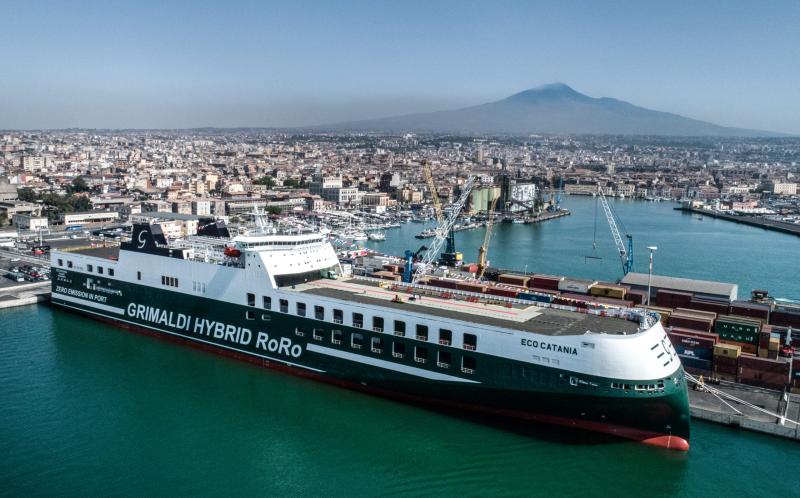Leclanche to Supply Battery Systems for Two New Grimaldi Hybrid Ro-Ro Vessels

Leclanché to Supply Battery Systems for Two New Grimaldi Hybrid Ro-Ro Vessels in Addition to the Nine Already in Operation.
- Ships feature zero emissions and silent operation in port and will operate alongside existing ferries on Grimaldi’s Italy-Spain line (Livorno-Savona-Barcelona-Valencia-Catania)
- Grimaldi Green 5th Generation hybrid vessels are cited as the largest and most environmentally friendly short-sea Ro-Ro vessels in the world
- Upon completion, Leclanché will have supplied 55 MWh of batteries for the Grimaldi fleet
- Leclanché’s Marine Rack System guarantees reliability and safety on board
Yverdon-Les-Bains – The Grimaldi Group, headquartered in Naples, Italy and one of the largest operators of roll-on/roll-off (Ro-Ro) ferries worldwide, has selected Leclanché SA (SIX: LECN) to supply battery systems for two of its latest hybrid vessels. The ships will be the 10th and 11th vessels in their Eco series, with Leclanché already having supplied marine rack systems for nine of them. With the addition of the two latest vessels (both 5 MWh each), Leclanché will have supplied 55 MWh of lithium-ion (Li-ion) battery systems for Grimaldi once the ships are delivered in 2024.
Grimaldi’s Green 5th Generation (GG5G) new hybrid fleet began its commissioning in November 2020 with the Eco Valencia, followed by sister ships – Eco Barcelona, Eco Livorno, Eco Savona, Eco Catania and Eco Malta from January through May 2021. This was followed by the Eco Mediteranea and Eco Adriatica in May and June of 2022, with the most recent vessel, the Eco Italia entering service in October 2022.
The identical Ro-Ro vessels are 238 meters long, 34 meters wide and a 67,311 gross tonnage. Each has a cargo capacity of around 500 truck trailers and 180 cars. Their hybrid propulsion systems include a 5 MWh Li-ion energy storage system and are fitted with exhaust gas scrubbers to reduce sulphur and particulate emissions.
The Grimaldi ferries are not only the largest short-sea Ro-Ro vessels in the world, but also the most environmentally friendly. Highly innovative technical solutions reduce their fuel consumption and optimise performance. Even with twice the loading capacity, the vessels consume the same amount of fuel as previous ship generations at the same speed – reducing CO2 emissions per transported unit by 50%. During port calls, the pure battery operation reduces the ships’ exhaust and noise emissions to zero. While sailing, the batteries are recharged by shaft generators as well as 350 m2 of solar panels. The complete hybrid propulsion system, supplied by Kongsberg Maritime, also includes electronically controlled variable frequency drives, energy management systems and Leclanché’s battery system.
Battery systems with superior safety for marine applications
The safety of Li-ion battery systems at sea is particularly important. Kongsberg Maritime and Grimaldi specified Leclanché’s highly reliable modular Marine Rack System (MRS) developed specifically for marine applications. It provides built-in protection against thermal events; heat and fire detection systems, hot gas exhaust ducts and an integrated fire extinguishing system reduce the risk of fire to virtually zero. Leclanché’s DNV certified Marine Rack System is liquid-cooled to minimize battery weight and footprint while maximizing battery performance and reliability over the life of the pack by avoiding the temperature gradients that can occur with air-cooled battery systems.
IP65 ingress protection for the complete battery system, an all-steel construction and all high voltage cabling and system elements being raised off the floor (to protect against flooding) are the result of Leclanché’s 113-year heritage in providing energy storage systems to industry.
The integrated foam-based extinguishing system provides complete protection should the unthinkable happen and a thermal incident occur. Flammable and toxic gases are vented from the ship to the open air by the battery ventilation system before they can spread within the vessel. Furthermore, each battery string has its own gas and smoke detectors. The modular nature of the battery architecture (28 self-contained battery strings) provides exceptional redundancy.
“We are very pleased to be among the first companies anywhere to operate a fleet of hybrid roll-on/roll-off ferries which represent the state-of-the-art in short-sea shipping marine vessels,” said Andrea d’Ambra, manager at Energy Saving, R&D and Ship Design in Grimaldi Group. “The Leclanché battery technology works like the mature system it is, providing silent and pollution-free operation while approaching and in-port, as well as supporting operations at sea. It has proven to be both safe and reliable and helps us to demonstrate a way forward to combating the proliferation of greenhouse gases.”
High quality battery systems manufactured in Europe
Leclanché is unique among marine battery system suppliers by manufacturing its own Li-ion cells at its facility in Willstätt, Germany. The cells have class leading cycle life, high energy density and utilise a water-based manufacturing process, reducing their environmental footprint while improving cell longevity. Along with the battery cells, the battery modules, electronics and the MRS are all Leclanché designed and manufactured in Europe.
“Leclanché’s Marine Rack System has become a de facto standard in the maritime industry and we would like to thank Grimaldi and Kongsberg Maritime for a partnership that has repeatedly resulted in history making vessels which are quiet, sustainable and highly energy efficient,” said Guillaume Clement, vice president, e-Marine Leclanché.
“Our work with Leclanché to deliver a fully integrated energy storage system with Kongsberg automation and energy management control, has been a positive and collaborative experience in advanced hybrid solutions in shipping.” said Morten Stanger, vice president sales, Kongsberg Maritime.
According to Phil Broad, CEO of Leclanché E-Mobility, “Populated coastal areas are exposed to emissions from a variety of harbour-related activities including ship traffic, loading/unloading and internal vehicular traffic. These all pose public health issues and further environmental pressures. According to recent studies, the average Ro-Ro/Ro-Pax vessel emits over 833 tonnes of CO2 per year during mooring operations.Therefore, a project such as this has a significant impact on greenhouse gas emissions and contributes to better air quality in port cities. We look forward to further joint collaborations.”
